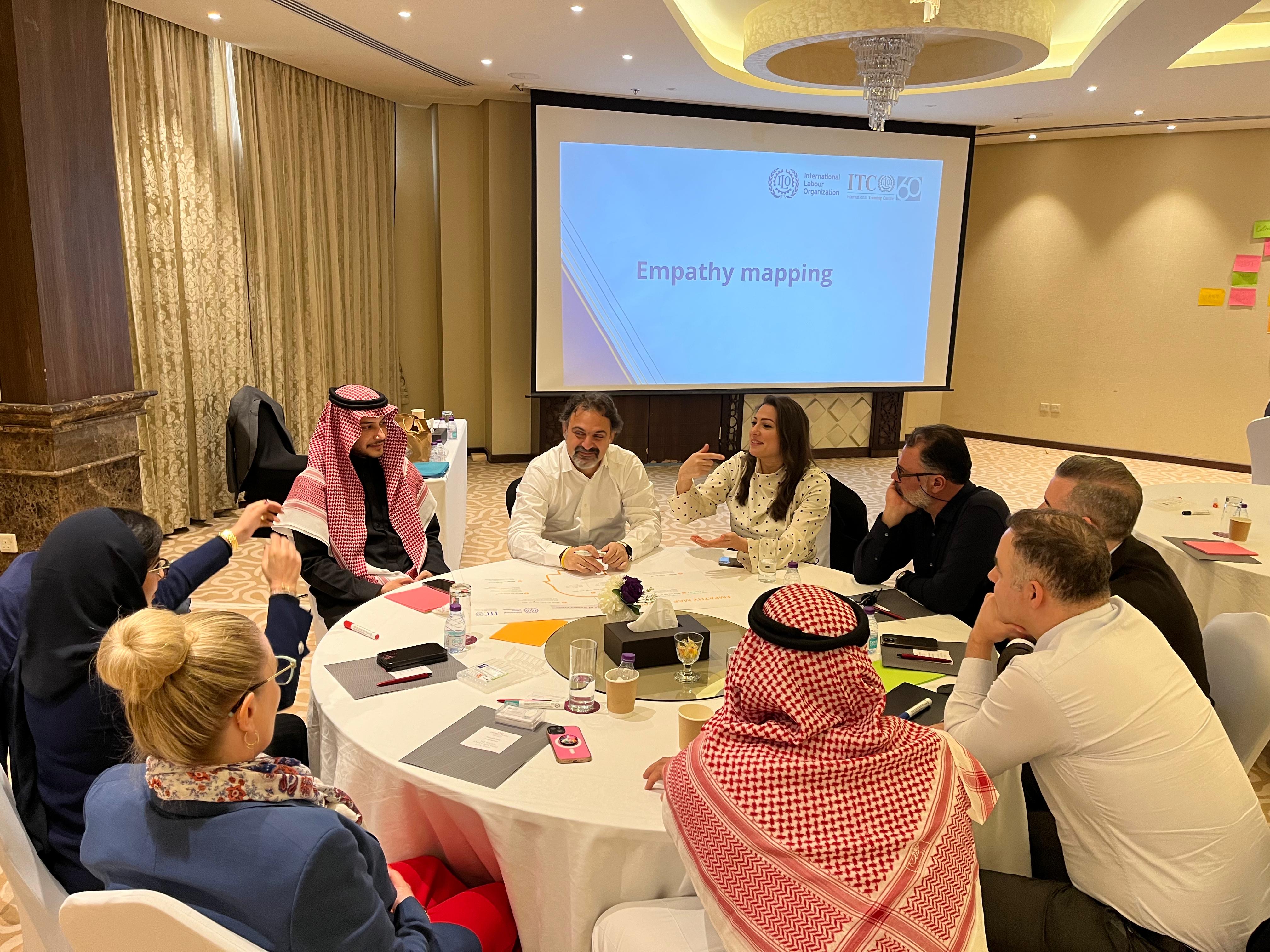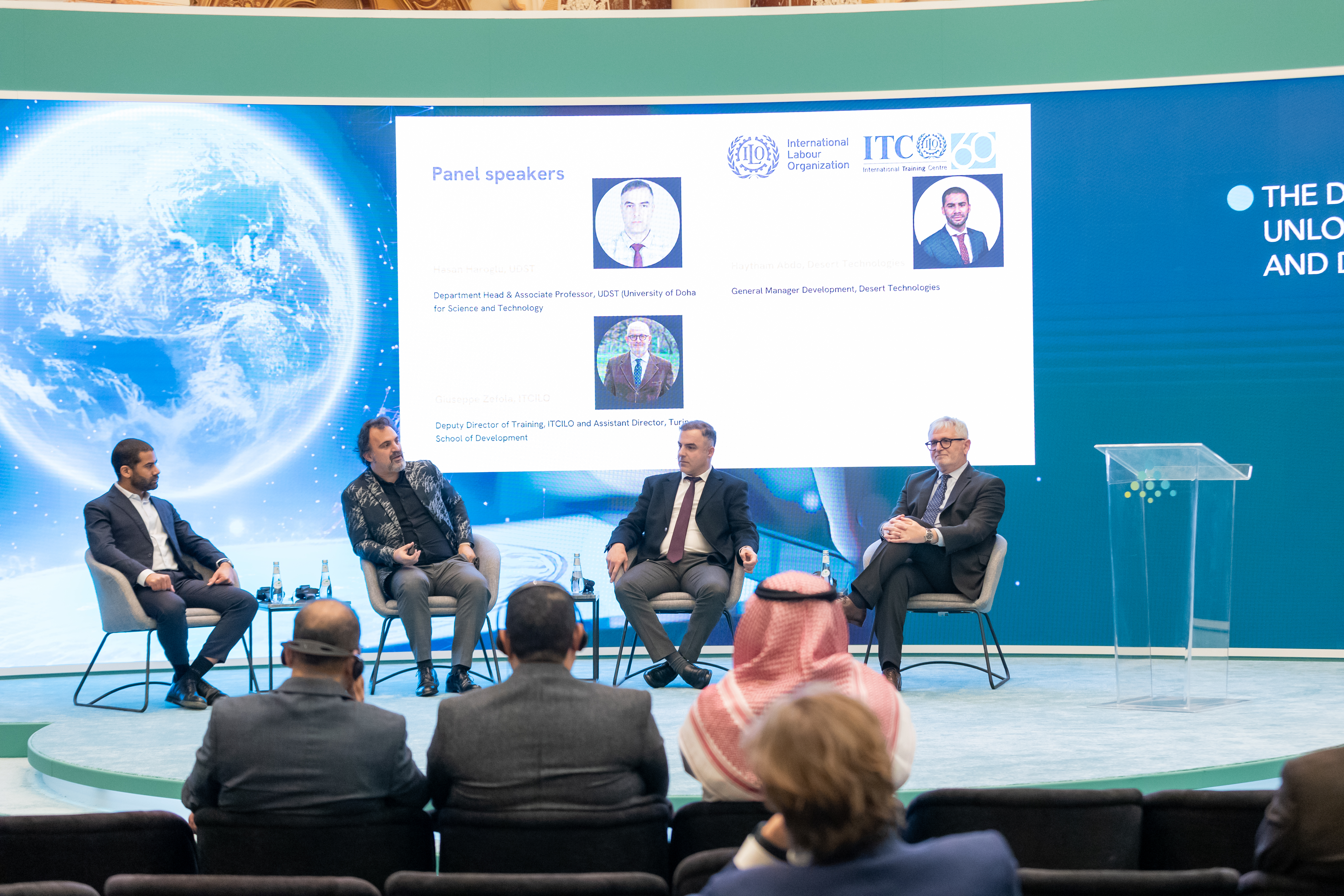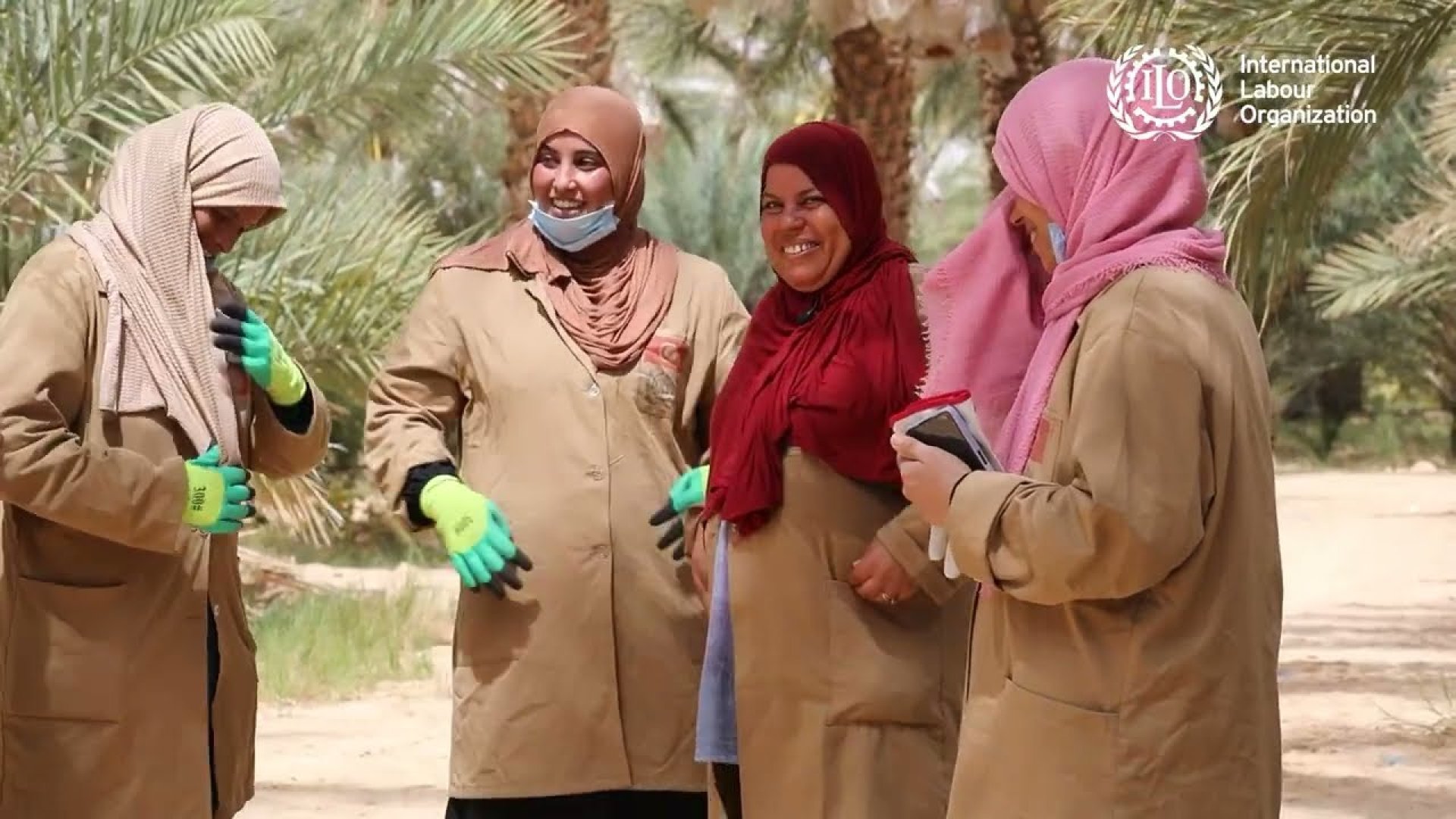Launching of the joint ILO - ITCILO Yellow Economy Global Initiative

Cover image © Adobe Stock/Shanorsila
Launching of the joint ILO - ITCILO Yellow Economy Global Initiative
Fostering job-rich growth and decent work to seize new opportunities in desert economies
In a groundbreaking move to harness the economic potential of desert regions, the International Labour Organization (ILO) and the International Training Centre of the ILO (ITCILO) hosted the Yellow Economy Design Sprint Workshop on January 28, 2025, in Riyadh, Saudi Arabia. This pioneering event marked the launch of the ILO Yellow Economy Global Initiative, bringing together key stakeholders, including policymakers, business leaders, and development practitioners, to explore innovative and practical solutions for fostering sustainable development, livelihoods, and job creation in arid and semi-arid environments. The Global Initiative will lead up to the Yellow Economy Foresight Event to be held later this year.
The Concept: What is the Yellow Economy?
Desert regions cover over a third of the Earth's landmass, yet they remain some of the most underdeveloped areas. With the right investments, these regions can become global leaders in sustainable energy, agriculture, and innovation.
The Yellow Economy encompasses all economic activities linked to desert ecosystems and their unique socio-environmental characteristics. It prioritizes sustainable development, innovation, and social inclusion, leveraging local knowledge and modern technologies to address climate challenges while generating decent work opportunities.
But at its centre, the Yellow Economy is also about people, about creating livelihoods that are adapted to these regions, resilient to climate change, and rooted in local realities.
The initiative focuses among others on key priority sectors:
- Clean and renewable energy
- Water Resource management
- Cultural and Creative Industries including Desert tourism, Sports, and Entertainment
- Sustainable agriculture, agri-tech and agri-business
- Livestock and Vet medicine
- Natural resource management
- Logistics and supply chain management
- Mining
- Building Construction
- Advanced Manufacturing
- Healthcare and Biotech
- Skills development
The future of work in desert economies will not only depend on technology and infrastructure, but on the skills, protection, and inclusion of the people who live and work there.
A New Vision for Sustainable Desert Economies
The Yellow Economy initiative aligns with the ILO’ and ITCILO’s mandate to advance decent work and economic growth (SDG 8) while addressing pressing global challenges, including climate adaptation, poverty reduction, and economic diversification.
As noted by Mr. Peter Rademaker ILO representative
Harnessing the potential of desert economies, including to create decent work requires collaboration, innovation, and a shared commitment to sustainability. Through this initiative, we aim to establish a comprehensive roadmap for the economic and social development of desertic regions. We chose Saudi Arabia for this first workshop as we wanted to draw upon and harness the expertise and institutions of the “Desert Kingdom” to anchor the global initiative we envisage, engaging people livening in desert economies around the world.
Peter Rademaker
ILO Deputy Regional Director, and Director of Decent Work Team for the ILO Regional Office Arab States
During the Yellow Economy Design Sprint Workshop held in Riyadh on January 28th, participants engaged in interactive sessions that reinforced the importance of a multidimensional approach to economic development in desert regions. Discussions focused on balancing heritage preservation and innovation, fostering partnerships, and identifying concrete steps for implementation.

The Design Sprint Workshop brought together governments, private sector representatives, researchers, development agencies, multilateral development banks, foundations, and international organizations to identify priority areas such as renewable energy, desert tourism, sustainable agriculture, and natural resource management. The program utilized design-thinking methodologies, including empathy mapping, case studies, and participatory design, to co-create actionable solutions tailored to desert economies.
The outcomes of the workshop directly informed discussions at the second edition of the Global Labour Market Conference (Riyadh, 29 January 2025) with reflections on how the Desert Economy can advance SDG8 in desertic regions, emphasizing the multidimensional nature of its approach. The event organized by the Ministry of Human resources and Social Development of the Kingdom of Saudi Arabia brought together high-level participants, including 45 labor ministers, presidents and representatives of international organizations focused on labor markets, as well as over 5,000 attendees and 200 speakers representing policymakers, experts, and specialists from more than 100 countries around the world.

Key Takeaways from the Workshop
- Decent Work & Sustainability: Economic models must integrate fair wages, social protection mechanisms, and safe working conditions while ensuring environmental sustainability.
- Balancing Tradition & Innovation: A combination of modern technologies and traditional practices can help create "Smart Desert Cities" and resilient rural economies.
- Public-Private Collaboration: Long-term partnerships between governments, the private sector, civil society, and international organizations will be crucial for the success of the Yellow Economy.
- A Roadmap for Action: The Yellow Economy Foresight Event in 2025 will be the next milestone, serving as a platform for international cooperation, knowledge-sharing, and project development.
What our Yellow Economy Ambassadors are saying on the Yellow Economy?
UNCCD COP16 strengthened global efforts to combat drought, land degradation, and desertification. Encouragingly, new concepts such as the Yellow Economy and Just Land Transition provide potential avenues to accelerate actions, particularly for the most vulnerable communities
Dr. Bradley Hiller
Lead Climate Change Specialist, Islamic Development Bank
The true value of desert land lies in how we manage it. Nature-based solutions are not just about restoring soil—they are about unlocking economic potential. By optimizing water use and enhancing land productivity, we transform deserts into assets, driving sustainable growth in agriculture, urban greening, and environmental resilience across Saudi Arabia and beyond
Prince Turki Fahad Al Saud
Chairman of Saudi Desert Control
The Yellow Economy is a green field of innovation, where skills are the seeds of progress, and the people of the desert cultivate the future. Investing in skills means turning challenges into thriving industries led by those who call the desert home
Azza El-Hayek
Co-founder SkillLab
The Role of South-South and Triangular Cooperation
South-South Cooperation offers significant opportunities for scaling up the Yellow Economy. The ILO and ITCILO are committed to facilitating knowledge exchange programs, policy innovation, and investment mobilization to support sustainable development in desert regions.
Key opportunities include:
- Technology and knowledge-sharing among countries with large desert regions.
- Support for decent work and job creation in emerging sectors like renewable energy, agritech, and desert tourism.
- Encouraging innovation and sustainable development through digital transformation and smart infrastructure projects.
- Leveraging public-private partnerships to mobilize financial investments for sustainable projects.
- Ensuring a just transition by supporting workers affected by desertification and climate change.
- Promoting cultural heritage and creative economies through crafts, music, and responsible tourism.
A successful pilot of a community-driven model for inclusive development is the ILO Pilot Initiative for Integrated Local development funded by the European Union and the Swiss Development and Cooperation Agency in El Barghouthiya, a small oasis village known for its deep-rooted agricultural traditions. Through support for employment-intensive investments, the ILO is helping farmers, cooperatives, and local communities unlock the full potential of their resources while ensuring social and economic inclusion.
Looking Ahead: a growing dynamic platform for multi-stakeholders’ dialogue and strategic vision-buil
As a next step, the ITCILO will launch a series of thematic webinars that will culminate in the Yellow Economy Foresight Event to be held later this year, which will bring together global leaders to strategize, implement solutions, and expand partnerships. With a strong focus on South-South and Triangular Cooperation, the initiative will drive real change by mobilizing resources, building capacities, and developing locally relevant yet globally scalable solutions.
As highlighted by Mr. Giuseppe Zefola, Deputy Director of Training of the ITCILO:
By uniting stakeholders across sectors and geographies, we are setting the foundation for a resilient and inclusive economic future in desert regions to create actionable strategies and solutions that promote inter-sectoral collaborations and address complex challenges in a dynamic global context
Giuseppe Zefola
Deputy Director of Training of the ITCILO
This initiative not only aims to address the unique challenges of desert economies but also leverages their untapped potential for economic diversification and job creation
Stefano Merante
Head of the catalyst Initiative at the ITCILO
Getting involved
The ILO and ITCILO invite governments, social partners, the private sector, investors, development agencies and banks as well academia, foundations and civil society organizations to take bold steps toward shaping a sustainable future for desert economies through transformative partnerships and knowledge-sharing.
Join us in pioneering a sustainable future for innovative desert economies. Contact us today to explore how your organization can make a lasting impact.
For partnership inquiries and participation in the Yellow Economy online and face to face future actions, contact us at: m.cunetto@itcilo.org
